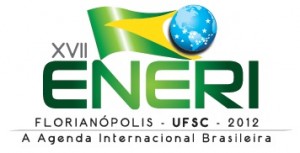
Yesterday I was in Florianópolis, in the state of Santa Catarina in Brazil’s South, to speak about Brazil’s role in the BRICS at the 17th National Encounter of International Relations Students (called “ENERI”), the largest I.R. conference in South America. The conference, which is entirely organized by undergraduate students and takes place at a different university every year, attracted over 1500 students from all over Brazil as well as an interesting list of speakers, including Stephen Krasner (Stanford), Barry Buzan (LSE) and Benjamin Cohen (UCSB), aside from Brazilian policy analysts and policy makers, such as former Foreign Minister Luiz Felipe Lampreia.
First of all, the event seemed to underline that the field of International Relations continues to boom in Brazil. There are more than 100 IR undergraduate programs, compared with only a handful in the 1990s. This is partly a response to Brazil’s growing global visibility and exposure to international issues. Traditionally, international issues rarely made headlines in the newspapers. Brazil’s rise increased the country’s insertion in the global economy, and President Lula’s assertive foreign policy contributed to the politicization of foreign policy, and nowadays it is common to see topics such as the crisis in the EU, negotiations with Iran or the rise of China occupy prominent space in the Brazilian media. This is largely a positive development: Foreign policy is now increasingly part of the democratic process, and the Foreign Minister now has to regularly justify his policies and face criticism – something quite rare in the past.
Yet Brazil remains rather isolated in comparison to other emerging powers, so the growing number of students studying international issues is to be welcomed. But caution is also warranted: While the number of I.R. students has surged, it is a far more complicated process to increase the number of qualified professors and lectures in the field, and there are still not enough PhDs in International Relations, International Politics or related fields to satisfy demand. At the same time, it remains to be seen in how far the market can absorb the growing number of graduates in the area – after all, Brazil’s foreign ministry selects only 30 applicants every year to become diplomats. While many actors in the private, public and not-for-profit sector lack the expertise to deal with international challenges, some members of Brazil’s older generation remain unsure what an International Relations degree really is, and how it differs from a program in, say, Political Science.
The second thing that was striking was the continued optimism that prevailed among the students regarding Brazil’s future role in global affairs. While I have not been able to attend all the debates and lectures, many students told me about their research interests and aspirations – many revolve about Brazil’s aspiration to play a global role and the challenges that come with greater international responsibilities. For example, how can Brazil mitigate fears among its neighbors that it will turn into a economic predator and regional bully? How can Brazil use the BRICS to promote its national interest? What is Brazil’s role as an emerging donor of humanitarian and development aid? The rather sobering economic data revealed in the past weeks, indicating that Brazil’s economy will grow much less this year than previously thought, did little to reduce the general belief that Brazil’s role in global affairs is set to increase and grow more complex.
The domestic debate about Brazil’s international role has grown considerably in the past years, yet more needs to be done to prepare Brazil’s society for the international responsibilities the country is set to assume in the coming years. Events such as the yearly ENERI conference are certainly an important contribution towards strengthening this discussion.
Read also:
Case study: Brazil’s regional problem
Can Brazil learn to manipulate China?
Can Dilma Rousseff fix U.S.-Brazil relations?
Leia também:
Como a imigração mudará o Brasil
Conversa com Maria Lydia Flândoli do Jornal da Gazeta: “A Força dos BRICS”
O Brasil na África: uma ponte sobre o Atlântico?
Clique aqui para receber a newsletter do Postwesternworld








